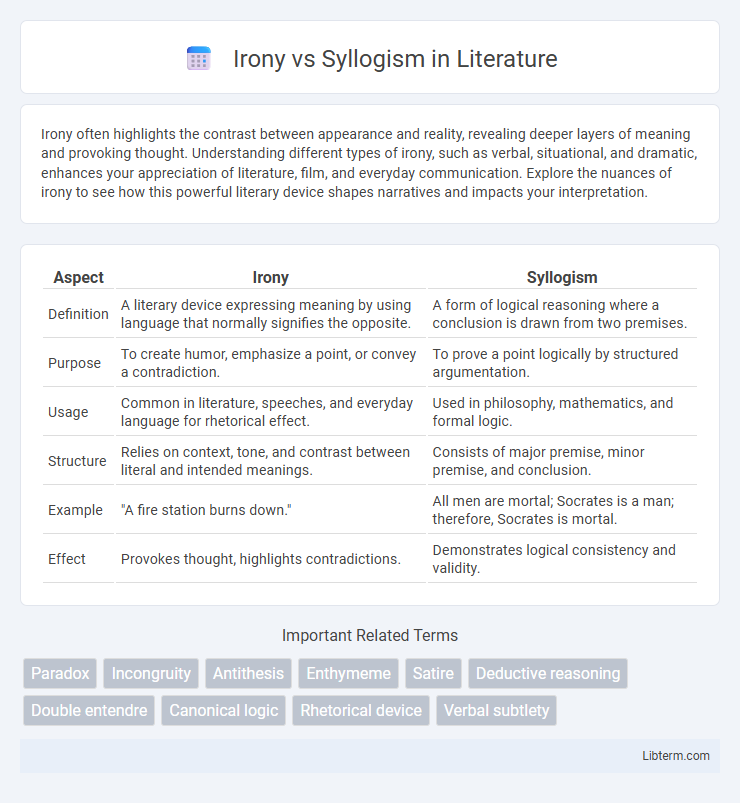Irony often highlights the contrast between appearance and reality, revealing deeper layers of meaning and provoking thought. Understanding different types of irony, such as verbal, situational, and dramatic, enhances your appreciation of literature, film, and everyday communication. Explore the nuances of irony to see how this powerful literary device shapes narratives and impacts your interpretation.
Table of Comparison
| Aspect | Irony | Syllogism |
|---|---|---|
| Definition | A literary device expressing meaning by using language that normally signifies the opposite. | A form of logical reasoning where a conclusion is drawn from two premises. |
| Purpose | To create humor, emphasize a point, or convey a contradiction. | To prove a point logically by structured argumentation. |
| Usage | Common in literature, speeches, and everyday language for rhetorical effect. | Used in philosophy, mathematics, and formal logic. |
| Structure | Relies on context, tone, and contrast between literal and intended meanings. | Consists of major premise, minor premise, and conclusion. |
| Example | "A fire station burns down." | All men are mortal; Socrates is a man; therefore, Socrates is mortal. |
| Effect | Provokes thought, highlights contradictions. | Demonstrates logical consistency and validity. |
Understanding Irony: Definition and Types
Irony involves expressing meaning through language that typically signifies the opposite, creating a contrast between appearance and reality. Key types of irony include verbal irony, where the speaker says one thing but means another; situational irony, characterized by unexpected outcomes contradicting expectations; and dramatic irony, which occurs when the audience knows critical information that characters do not. Understanding these distinctions enhances comprehension of rhetorical strategies and their impact on communication and literature.
Syllogism Explained: The Structure of Logical Argument
Syllogism is a form of logical argument that employs two premises to arrive at a conclusion, structured as major premise, minor premise, and conclusion. It relies on deductive reasoning, ensuring that if both premises are true, the conclusion must be true, exemplified by statements like "All humans are mortal; Socrates is a human; therefore, Socrates is mortal." Unlike irony, which uses contradiction or implied meaning for effect, syllogism focuses on clarity and validity in argumentation through formal logical structures.
Fundamental Differences Between Irony and Syllogism
Irony is a rhetorical device where the intended meaning contrasts with the literal expression, often used to convey humor or criticize indirectly. Syllogism is a form of logical reasoning consisting of a major premise, a minor premise, and a conclusion, used to deduce truth from given statements. The fundamental difference lies in irony's reliance on contradiction and ambiguity to evoke interpretation, whereas syllogism depends on structured logic to establish valid conclusions.
How Irony Functions in Language and Literature
Irony functions in language and literature by conveying meaning opposite to the literal interpretation, creating layers of significance that engage readers cognitively and emotionally. It relies on context, tone, and shared knowledge to reveal contradictions between appearance and reality, often highlighting human folly or social critique. This rhetorical device contrasts with syllogism, which uses structured logical reasoning to arrive at a conclusion based on premises.
The Role of Syllogism in Logical Reasoning
Syllogism plays a crucial role in logical reasoning by providing a structured framework to derive conclusions from two premises, typically a major and a minor premise. Unlike irony, which relies on contrast and implied meaning, syllogistic reasoning depends on clear, formal logic to ensure the validity and soundness of arguments. Mastery of syllogisms enhances critical thinking and supports the systematic evaluation of propositions in philosophy, mathematics, and computer science.
Examples of Irony in Everyday Communication
Irony in everyday communication often appears when a speaker says the opposite of what they mean, such as sarcastically commenting "Great weather!" during a storm. In contrast, syllogism exemplifies logical reasoning, such as the classic example: "All humans are mortal; Socrates is human; therefore, Socrates is mortal." Irony adds nuance and humor to conversations, while syllogism strengthens arguments with structured, deductive logic.
Syllogism in Classic and Modern Philosophy
Syllogism, a fundamental tool in classic philosophy introduced by Aristotle, structures logical arguments through a major premise, minor premise, and conclusion, ensuring deductive reasoning's validity. Modern philosophy expands upon this framework by integrating formal logic and symbolic representations, refining syllogistic methods to address complex reasoning beyond traditional categorical forms. This evolution underscores syllogism's enduring importance in both classical logic and contemporary analytical philosophy.
Irony vs. Syllogism: Impact on Persuasion
Irony leverages contrast between literal meaning and intended message to engage audiences emotionally, often provoking critical thinking and skepticism toward the subject. Syllogism employs a logical structure of premises leading to a conclusion, appealing to reason and facilitating clear, rational persuasion. The impact on persuasion differs as irony can create a memorable, nuanced influence while syllogism aims for straightforward, credible argumentation.
Recognizing Irony and Syllogism in Rhetorical Strategies
Recognizing irony in rhetorical strategies involves identifying statements where the intended meaning contrasts sharply with the literal expression, often to emphasize a point or evoke humor. Syllogism, a form of logical reasoning, is detected through its structured argument with a major premise, a minor premise, and a conclusion that logically follows. Distinguishing irony from syllogism depends on analyzing context: irony relies on tone and implied meaning, while syllogism depends on formal logical progression.
Choosing Between Irony and Syllogism: When and Why
Choosing between irony and syllogism depends on the communicative goal: irony effectively highlights contradictions or critiques by implying the opposite of what is stated, while syllogism relies on logical reasoning to derive conclusions from premises. Use irony when aiming to provoke thought, evoke humor, or underscore hypocrisy in a subtle manner. Opt for syllogism in arguments requiring clear, structured, and persuasive logic to convince an analytical audience.
Irony Infographic

 libterm.com
libterm.com